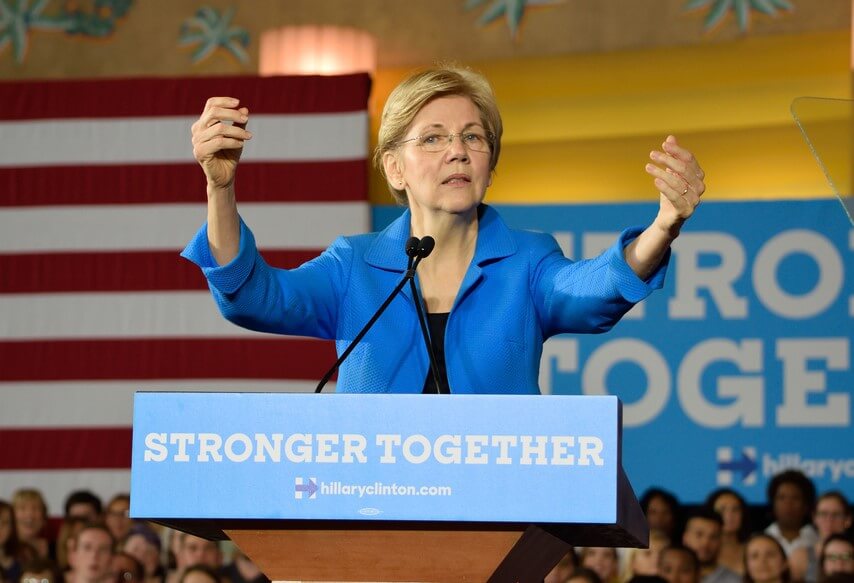Massachusetts Senator Elizabeth Warren has been a policy proposal whirlwind ahead of the 2020 Democratic primary for the right to face incumbent President Donald Trump, and now she fancies herself a market prognosticator, predicting an incoming economic collapse.
“Warning lights are flashing. Whether it’s this year or next year, the odds of another economic downturn are high — and growing,” Warren wrote in a blog post this week on Medium.
Citing S&P Global Ratings Chief Economist Beth Ann Bovino, Warren said “failure to raise the debt limit would likely be more catastrophic to the economy than the 2008 failure of Lehman Brothers and would erase many of the gains of the subsequent recovery.”
A bipartisan plan to raise the debt ceiling was announced Monday. Though, it has yet to be approved by Congress. Failure to raise the debt ceiling would trigger another government shutdown after we just had a record-long shutdown in December and January of this year. Another shutdown, Bovino said, would cost the economy $6.5 billion for each week it’s allowed to continue.
“A disruption in government spending means no government paychecks to spend at the mall, lost business and revenue to private contractors, lost sales at retail shops, particularly those that circle now-closed national parks, and less tax revenue for Uncle Sam,” Bovino wrote in a note. “That means less economic activity and fewer jobs.
“With markets somewhat jittery about a possible selective default of the U.S. sovereign, worries of a shutdown threat only adds to their concerns. The shutdown and the looming debt ceiling combined could significantly hurt business and consumer sentiment, as well as the overall economy.”
Warren also mentioned weakness in the manufacturing sector, blaming Trump’s trade war with China and saying the sector is now in a recession with wages lagging behind the national average.
“The country’s economic foundation is fragile. A single shock could bring it all down. And the Trump Administration’s reckless behavior is increasing the odds of just such a shock,” Warren wrote.
Warren also took credit for predicting the 2008 crash, which Politifact verified as a “true” statement.
Trump has constantly boasted about the “greatest economy in the history of our country,” with the S&P 500 soaring almost 40% since he was inaugurated and unemployment lows the U.S. hasn’t enjoyed in nearly 50 years.
Growth, however, is expected to slow, and Friday’s GDP estimate is expected to be around 1.8%, according Dow Jones estimates, which is a considerable slowdown from Q1’s 3.1%.
Warren is a bankruptcy law expert who also was a professor at Harvard, so she does have legitimate insight into the business world, where she is a fierce consumer advocate as Senator.
“In 2003, I called out subprime lenders for tricking unsuspecting families — especially families of color — into refinancing into overpriced subprime mortgages. In 2004 and 2005, I warned that families were getting deeper into debt and hanging on only by borrowing against their homes, which put them in a vulnerable position if costs rose or a family member lost a job,” she wrote. “In 2006, I flagged that foreclosure rates were starting to go up, but that the mortgage lenders were still churning out loans because they had passed on the risk of defaults to investors in the form of mortgage-backed securities. Those trends — shady subprime lending, rising household debt, a mortgage market where lenders didn’t bear the risk of their loans — set the stage for the 2008 crisis.
How does Warren propose we head this crisis off? Well by electing her, of course.
“The good news is that we have the chance to head off a crisis — just like we had a chance to head off the 2008 crisis — if we take bold action now to address the underlying problems in the economy:
- Reduce household debt: To put our economy — and our families — on firmer ground, it is essential to reduce household debt both by raising people’s wages and by bringing down their costs. That is the heart of my economic agenda. We can raise incomes by increasing the minimum wage to $15 an hour, strengthening unions, ensuring that women of color get the wages they deserve, and empowering workers to elect at least 40% of board members at big American corporations. We can reduce costs and slash household debt by cancelling up to $50,000 in student loan debt for 95% of people who have it, bringing down the cost of rent, providing universal affordable child care and early education for all our kids ages 0–5, and making tuition free at every public technical school, two-year college, and four-year college.
- Monitor and reduce leveraged corporate lending: In response to the 2008 crisis, Congress created the Financial Stability Oversight Council — made up of the heads of the financial regulatory agencies — to monitor risks that cut across different markets. The risks of leveraged lending are exactly the kind of thing FSOC is supposed to monitor, but the Trump-era FSOC is falling down on the job. It should meet specifically to discuss these risks and announce a plan for addressing them. Federal regulators should also enforce leveraged lending guidance that is intended to stop banks from issuing these risky loans in the first place.
- Strengthen manufacturing: We need policies that reverse the manufacturing job losses of the past twenty years by investing in manufacturing instead of undercutting it. My Green Manufacturing Planwill mobilize our industrial base by making a $2 trillion investment in American green research, manufacturing, and exporting over the next decade. This will create more than a million high-quality jobs and help address the existential threat of climate change.
- Limit potential shocks to the economy: With a vulnerable economy, we should be reducing the odds of potential shocks that could push us into a downturn. The Trump Administration should stop pushing for a no-deal Brexit and start planning for how to insulate the American economy if that occurs. It should replace the trade-war-by-tweet with China with a coherent strategy — working with our allies — to respond to China’s trade tactics. We need to invest in strengthening critical American industries, instead of undercutting American companies. And we should take the prospect of breaching the debt ceiling off the table forever by either eliminating it or by automatically raising the ceiling to accommodate spending and revenue decisions authorized by Congress.




